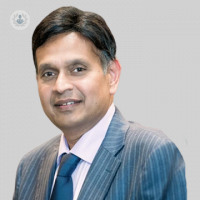Hyperthyroidism: what to expect from treatment
Written by:The thyroid gland can be found in the neck, situated just below the Adam's apple. Its job is to regulate hormones. Hyperthyroidism is essentially an overactive thyroid, which can mean an overproduction of hormones which can result in serious consequences.
Professor Parag Singhal, a top endocrinologist, explains some of the treatment options available for hyperthyroidism, how effective treatment can be and some of the risks involved.

What are the treatment options available?
Tablets
There are a variety of tablets that can help bring thyroid hormone levels back to normal to prevent long-term health problems and relieve uncomfortable symptoms. Some of the options are:
- Beta-blockers:
These do not stop thyroid hormone production but can reduce symptoms until another treatment will take effect. Beta-blockers act quite quickly to relieve many of the symptoms, such as rapid heartbeat, tremors and nervousness.
- Antithyroid medicines:
Antithyroid therapy is the simplest way to treat hyperthyroidism. These medicines usually don’t provide a permanent cure either. The two available medicines are carbimazole and propylthiouracil. You’ll usually need to take the medicine for a couple of months before you notice any improvements. Pregnant women usually have to take propylthiouracil during the first three months of pregnancy because carbimazole can harm the foetus.
Once your thyroid hormone levels are under control, your dose may be gradually reduced and then stopped. Some people may need to continue taking medicine for many more years or possibly for life.
Radioiodine therapy
The oral medication is absorbed by your thyroid glands. Radioactive iodine works by gradually destroying the thyroid. This, in turn, reduces your hyperthyroid symptoms. This treatment can permanently cure hyperthyroidism and causes little side effects on the rest of your body. Some may require a repeat of this treatment, this means you’d have to take thyroid hormone replacement therapy.
Surgery
The partial or total surgical removal of the thyroid is called a thyroidectomy. This is performed by an experienced surgery and it is an effective and safe treatment. As with any surgery, it poses some small risks, including potential damage to the parathyroid glands and vocal cords. Surgery tends to be recommended for certain types of hyperthyroidism.
How will my doctor determine the best hyperthyroidism treatment for me?
Tailored to the needs and circumstances of the patients. This is why patients need to be seen by specialists. Tablets are often the first line of treatment.
Is hyperthyroidism permanent?
Definitive treatment can cure hyperthyroidism though this leads to hypothyroidism where your thyroid gland does not produce enough hormones. Unfortunately, there is no way of preventing an underactive thyroid. Hypothyroidism usually lasts 12 to 18 months, but sometimes it is permanent.
Does treatment for hyperthyroidism have side-effects?
Side effects are rare and generally seen with high doses. Side effects vary depending on the type of drugs you will be recommended by an expert who will recommend the best treatment option for you.
Can lifestyle choices help manage hyperthyroidism?
Treatment is the only way to manage and control hyperthyroidism.
If you feel you may be suffering from an overactive thyroid (hyperthyroidism), it is recommended you speak with a specialist such as Professor Singhal who will be able to treat you. To make an appointment with Professor Singhal, enquire here.


